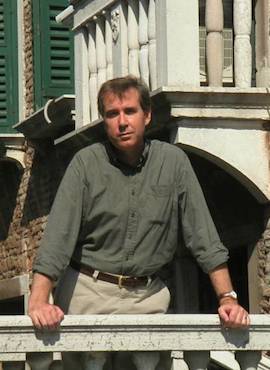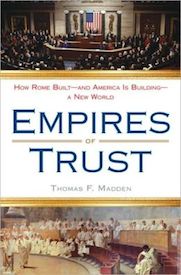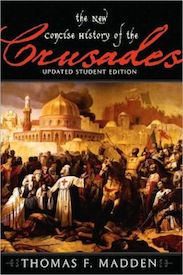Empires of Trust: How Rome Built — and America is Building — A New World
It has become fashionable among Leftists to compare the United States of America to the Roman Empire — both supposedly weary empires in decline, beset by decadence within and hungry, determined enemies outside. Of course, that’s just how the Left wants to see America. But now, the renowned historian Thomas F. Madden says that there is something to the link after all.
In “Empires of Trust: How Rome Built — and America is Building — A New World,” Madden compares America and Rome in detail, demonstrating that the U.S. does indeed have notable similarities to Rome — but not to the late, dissolute and declining Roman Empire. Rather, Madden shows here that the best comparison is to the noble Roman Republic, which was universally expected to (and usually did) uphold high moral standards in dealing with defeated enemies, and brought stability and the rule of law to previously ungovernable areas. America, like Rome, he says, built an empire not of force, but of decency and good government — an empire of trust. Romans ended up ruling the known world precisely because they did not want to conquer other nations. And their “empire of trust” lasted hundreds of years after dire predictions that societal decadence and public corruption would doom it.
Madden (author of the acclaimed “The New Concise History of the Crusades”) explains that America has become what is essentially an imperial power in much the same way that the Roman Republic did. Both America and Rome opposed the idea of empire, which is precisely why they ended up playing the role of the world’s policemen: they became global authorities that other powers trusted and looked to for guidance. Examining in detail the histories of the Roman and American republics, he shows how in both cases the citizens and leaders acquired a level of trust among allies and potential enemies that was based above all upon their unusual rejection of hegemonic power.
The parallels don’t end there, either. Madden shows how Romanization introduced a stable government and legal system to millions who had up to that point lived in virtual anarchy. Roman rule radically improved the lives of those in the empire, and the Romans never hesitated to invest their resources and manpower in rebuilding the lands of their former enemies. That legacy, not militarism or cultural decadence, is the real parallel to today?s American-led Western dominance in international relations, trade, and commerce, as well as in culture and political theory.
In eludicating these remarkable similarities, Empires of Trust makes a strong case for America?s international position today, revealing the hollowness of the Leftist claims that American “imperialism” is a force for evil.
The Roman and American Republics — forces for good in the world:
- How the U.S. Constitution was influenced by Roman models
- The crucial differences between an Empire of Conquest and an Empire of Trust
- The Pax Romana and the Pax Americana: why peace cannot be established unless the leading state has overwhelming power
- Why the United States is not like imperial Rome during its period of decline
- Why prophecies of its impending doom are signs of the success, not the failure, of Empires of Trust such as Rome and the United States
- How the American reluctance to get involved in foreign conflicts parallels a similar hesitation in the Roman Republic
- Why the drumbeat of calls for foreign participation in American presidential elections is likely only to increase
- Anti-Americanism: why it?s on the rise in Europe today — and how the Romans dealt with a similar phenomenon
- Has the American president become a new Augustus, ruling by imperial fiat — as in paranoid Leftist fantasy? Not even close
- How the ancient Romans shared the American military’s “hoo-ah” spirit: the conviction that “technology — and Americans — can fix anything”
- How Rome fought and won its own “war on terror”: including the astonishing and instructive lessons for us today
“A much needed reassessment of the now hackneyed view that we are simply grasping Romans — and thus are doomed to suffer the same imperial decadence. But Thomas Madden shows us a different Rome that established security and prosperity — and trust — winning the hearts and minds of millions in the Mediterranean world. Likewise the United States has become powerful abroad due to its marriage of force with credibility and the rule of law. An original
thesis, lucidly argued — and timely in an uncanny fashion.” — Victor Davis Hanson, author of Carnage and Culture and A War Like No Other: How the Athenians Fought the Spartans
“Most comparisons of Rome and the United States are meditations on imperial decline. Madden, on the other hand, asks us to contemplate the invisible and often unconscious dynamic that transforms some nations into empires, often against their will. This is a big idea, presented in a prose style that defies the jargon-choked language of so much scholarship today. This is a break-out book.? — Joseph J. Ellis, Pulitzer Prize winning author of Founding Brothers and His Excellency: George Washington
“So much nonsense has been written and talked in recent years about America as the New Rome — a Republic on the verge of imperial corruption, or an empire on the verge of dissolution — that it is a breath of fresh air to read Thomas Madden. His scholarly credentials as a pre-modern historian are impeccable. Yet he also has the ability, too rare in the academy, to write with bracing clarity and to address our present preoccupations. No, we aren?t Rome. But understanding why not, as Madden demonstrates, is an essential precondition for appreciating what we really are.? — Niall Ferguson, Professor of History at Harvard University and author of Colossus: The Rise and Fall of the American Empire
Tags: Empires of Trust, Thomas Madden
- The Author

Thomas F. Madden
Thomas F. Madden is Professor of History and Director of the Center for Medieval and Renaissance Studies at Saint Louis […] More about Thomas F. Madden.
- Books by the Author















